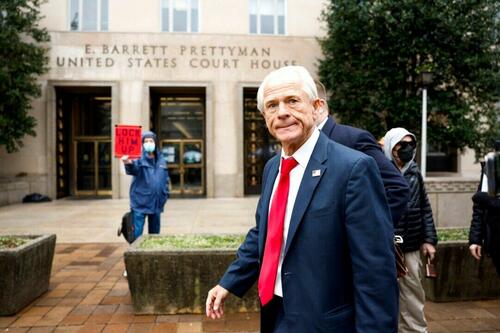Peter Navarro Asks Supreme Court To Allow Him To Avoid Reporting To Prison Pending Appeal
Former Trump White House aide Peter Navarro on March 15 asked the Supreme Court to allow him to avoid reporting to prison for a contempt of Congress conviction as the matter is being appealed.
The Epoch Times’ Sam Dorman reports that Navarro’s request came after the U.S. Court of Appeals for the DC Circuit denied his request for release from prison pending appeal. Mr. Navarro revealed on March 10 that he was ordered to report to a Miami prison on March 19 for a four-month sentence.
Mr. Navarro filed an emergency petition to Chief Justice John Roberts on Friday afternoon, arguing that his appeal “will raise a number of issues on appeal that he contends are likely to result in the reversal of his conviction, or a new trial.”
“For the first time in our nation’s history, a senior presidential advisor has been convicted of contempt of Congress after asserting executive privilege over a congressional subpoena,” Mr. Navarro’s lawyers wrote.
“Navarro is indisputably neither a flight risk nor a danger to public safety should he be released pending appeal,” they added.
As Zachary Stieber detailed earlier via The Epoch Times, former Trump White House aide Peter Navarro’s bid to delay his prison sentence as he appeals his conviction was rejected on March 14 by a federal court.
Mr. Navarro, who was convicted in 2023 of contempt of Congress for defying a subpoena from the House Jan. 6 select committee, is slated to report to prison on March 19.
His bid to stay out of prison while he appeals his conviction was turned down initially in February by U.S. District Judge Amit Mehta, who found that the trade adviser to former President Donald Trump failed to pose any substantial questions of law in his motion. Mr. Navarro then asked an appeals court to overturn Judge Mehta’s ruling.
In the decision on March 14, the U.S. Court of Appeals for the D.C. Circuit rejected the fresh bid.
“Appellant has not shown that his appeal presents substantial questions of law or fact likely to result in reversal, new trial, a sentence that does not include a term of imprisonment, or a reduced sentence of imprisonment that is less than the amount of time already served plus the expected duration of the appeal process,” the court said.
The ruling from the three-judge panel, which included Circuit Judges Patricia Millett, Cornelia Pillard, and Robert Wilkins—all of whom were appointed by former President Barack Obama—was unanimous.
Federal law requires individuals seeking release pending an appeal to present a “substantial question of law or fact” that is likely to result in one of the outlined results.
According to circuit precedent, a substantial question is a question “that very well could be decided the other way.”
Mr. Navarro argued in filings to the appeals court that, as a senior presidential adviser, he was protected by executive privilege. He said the case presents questions that could be decided the other way and thus the appeals court should grant his motion.
“Because the congressional subpoena to Dr. Navarro implicated former President Trump’s privilege, it was incumbent upon Congress and/or the Department of Justice to confirm with the Judicial branch that the privilege could be overcome, and, having failed to do so, the indictment as against Dr. Navarro must be dismissed,” one filing stated. “At the very least, this issue presents a “close question” or a question, “that very well could be decided the other way,” and this court should order that Dr. Navarro be released pending his appeal.
Government officials in a brief to the court said that Mr. Navarro didn’t present any substantial questions. Government lawyers said that Mr. Navarro never established that President Trump invoked privilege and that President Joe Biden waived any privilege.
“And even if President Trump had asserted executive privilege, Navarro still could not show a likelihood of reversal or a new trial, because it would not have justified his total noncompliance with the subpoena,” they said.
Mr. Navarro had said that even if there was no presumptive privilege, he “reasonably believed he was dutybound to assert former President Trump’s executive privilege,” which he said should preclude prosecution for contempt.
“Once an assertion of executive privilege had been made, it was incumbent upon the respective government branches to navigate its application,” one filing stated.
In another, his lawyers said that “the government blithely dismisses Dr. Navarro’s argument that requiring a formal invocation by a former president risks vitiating the privilege entirely insofar as to hold otherwise would preclude a former president unexpectedly suffering from disability or death to assert the privilege and enable the recalcitrant or disgruntled to affirmatively waive the privilege unbeknownst to the president.”
A lawyer for Mr. Navarro declined to comment on the new ruling.
Mr. Navarro was sentenced to four months in prison by Judge Mehta, another Obama appointee. Mr. Navarro was ordered by federal officials to report to the Bureau of Prisons in Miami for detention no later than 2 p.m. on March 19, according to his lawyers.
Tyler Durden
Sat, 03/16/2024 – 09:20
via ZeroHedge News https://ift.tt/t3fL4ru Tyler Durden
